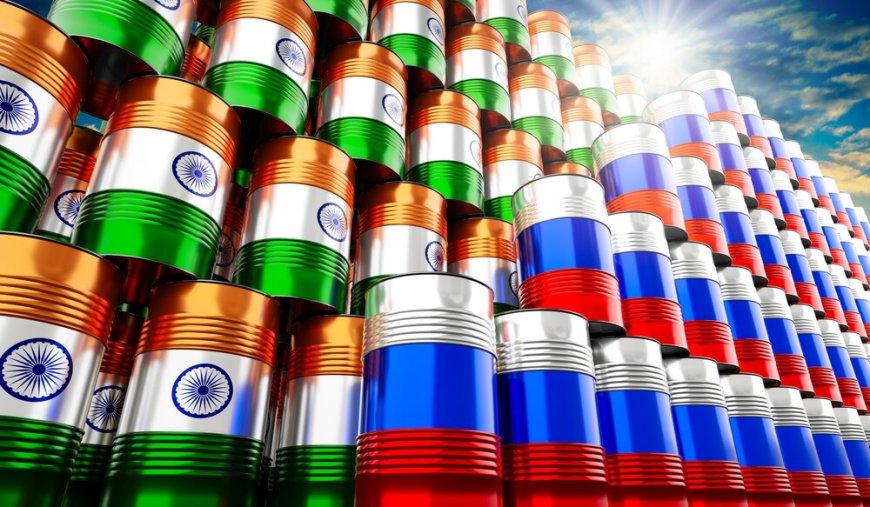India and Russia: Increasing Oil Trade
Russia and India play fundamentally different roles in global energy markets. The Russian Federation possesses the largest hydrocarbon reserves (oil, gas, coal) and is among the world’s largest producers and exporters of fossil energy resources.

“India and Russia: Increasing Oil Trade”
Since the onset of the Ukraine conflict, referred to as the "Russian special operation," and more than three years having passed since that time, we have witnessed the unilateral sanctions imposed by the Western bloc on the Russian Federation. Over 18,000 types of sanction restrictions have been applied to this country, primarily aimed at reducing Russia's oil and energy exports. However, despite all the stringent sanctions led by the United States and the Western bloc, Indian buyers have been seeking ways to continue importing Russia’s cheap crude oil through intermediaries and newly established trading companies to maintain and improve their supply chains.
It should be noted at the outset that although in some cases these sanctions have caused Indian oil companies to lose Russian oil shipments, they remain hopeful of overcoming these challenges by leveraging Russian discounts and methods such as using old oil tankers without Western-specific insurance, renaming Russian oil at secondary origins, or utilizing newly founded trading companies. Meanwhile, other challenges like transportation, insurance, and payment issues persist. Yet, due to the mutual needs of both parties, cooperation between Russia and India in the energy market has not only continued but also increased. We recall that the relationship between India and Russia, based on energetic, defense, and technological cooperation, has for decades been recognized as a symbol of constructive interaction between these two global powers.
This fact led to a situation where, under the Western countries' decision to set a $60 price cap per barrel of Russian crude oil — intended to prevent price increases and shortages in the global market, especially in Western countries — Indian buyers not only gained significant profits but also created a suitable mechanism for easier sales of Russian oil.
According to articles published in Bloomberg, Indian refineries are now eager to increase imports of cheaper Russian crude oil amid fluctuations in the global market. Indian officials believe that in the current circumstances, under the pressure of U.S. sanctions, any disruptions in these transactions are temporary, and such cooperation can continue. On the other hand, the unfair U.S. sanctions on crude oil transactions have not deterred buyers; instead, they have forced many buyers and sellers in Russia to find various new ways to exchange existing products.
Among the main reasons for this situation are the longstanding India-Russia relations as one of the most important strategic partnerships internationally, energy diplomacy, and a multilateral diplomacy strategy aimed at balanced development among members of the new international economic order discourse (or South-South cooperation). In such conditions, the political and economic interests of India and Russia have dictated expanding oil trade and strengthening India’s strategic reserves. On the other hand, this has led Russia to increase efforts and offer creative solutions to maintain its market share in Asia.
It should be noted that currently, India is one of the largest oil consumers globally, and according to the International Energy Agency, India will be the world’s largest energy consumer within the next 20 years. Therefore, we can observe India’s strategic dependency on energy supply. This issue has made energy supply one of India’s main priorities in advancing its foreign policy, and certainly, any disruption in this supply would negatively impact India’s economy, development, domestic programs, and foreign policy.
Russia and India play fundamentally different roles in global energy markets. The Russian Federation possesses the largest hydrocarbon reserves (oil, gas, coal) and is among the world’s largest producers and exporters of fossil energy resources.
In contrast, India is one of the biggest energy and fuel importers and has increased its energy imports over the years to meet the demands of its growing economy and developing social sectors. Even under current Western sanctions and despite Western concerns over the deepening Delhi-Moscow cooperation and its tangible effects on the unity of sanctions policy against Russia, India is eagerly striving to secure cheap energy and benefit from Russian oil discounts.
This alone is a clear indication of the ineffectiveness of Western bloc sanctions and restrictions. As we clearly observe, despite the strictest limitations, demand for Russian oil and energy products is rising. Many analysts believe this situation marks a turning point in the international order, and certainly, the era of U.S. hegemony will be replaced by a new multipolar system.













































